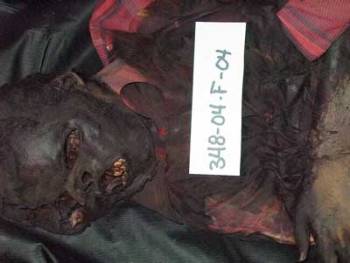

Burgers uit Falluja, die om het leven zijn gekomen door een Amerikaans bombardement met wit fosfor. Het Nederlandse kabinet steunt de gewelddadige Amerikaanse politiek in het Midden Oosten. Daarmee is het indirect mede verantwoordelijk voor deze oorlogsmisdaden.
'The use of white phosphorus "violates the Geneva Protocol for the Prohibition of the Use in War of Asphyxiating, Poisonous or Other Gases, and of Bacteriological Methods of Warfare. Incendiary agents such as napalm and phosphorus are not considered to be CW agents since they achieve their effect mainly through thermal energy. [Ref. http://www.reachingcriticalwill.org/legal/cw/cwindex.html ]However, a report by the Agency for Toxic Substances and Disease Registry concludes that White Phosphorus achieves its effects mainly through non-thermal energy. It must be concluded that White Phosphorus is considered a CW [chemical weapon] agent, and would violate the Geneva Protocol since its use causes indiscriminate and extreme injuries especially when deployed in an Urban area such as Falluja, Iraq.Pictures of the dead of Falluja have been published by reporter Dahr Jamal of the Electronic Iraq project, and several commentators have suggested that their injuries are consistent with the use of White Phosphorus by US forces in Falluja.'
'Rebuilding Not Yet Reality for Fallujah
By Dahr Jamail and Ali Fadhil Inter Press Service
Sunday 25 June 2006
Fallujah - One and a half years after the November 2004 U.S. military assault on Fallujah, residents tell of ongoing suffering, lack of jobs, little reconstruction and continuing violence.
The U.S. military launched Operation Phantom Fury against the city of Fallujah-destroying an estimated 70 percent of the buildings, homes and shops, and killing between 4,000 and 6,000 people, according to the Fallujah-based non-governmental organisation the Study Centre for Human Rights and Democracy (SCHRD).
IPS found that the city remains under draconian biometric security, with retina scans, fingerprinting and X-raying required for anyone entering the city. Fallujah remains an island: not even the residents of the surrounding towns and villages like Karma, Habbaniya, Khalidiya, which fall under Fallujah's administrative jurisdiction, are allowed in.
Security badges are required for anyone wishing to enter the city. To obtain a badge, one has to be a Fallujah native from a certain class. That is, if one is from Fallujah and a government official, a high-class badge of grade G will be issued. Journalists with an X-grade badge will be allowed. Then there are B for businessmen and C for those who have contracts with U.S. military in the city. Last are the R-grade badges, which will not be admitted through the main checkpoint at the east side of the city, and must seek entrance through "second class" checkpoints elsewhere.
Having entered the city through the main checkpoint, the first thing visible is the destroyed homes in the Al-Askari district. Virtually every home in this area has been completely destroyed or seriously damaged.
"I could not rebuild my house again because rebuilding is rather costly nowadays," Walid, a 48-year-old officer with the former Iraqi army, told IPS. With sorrow in his eyes he told of how he built his home six years ago. After the destruction, "They [U.S. Military] paid us 70 percent of the compensation and with the unemployment in the city we spent most of it on food and medicines. Now everybody is waiting for the remaining 30 percent."
Slightly different version of this same story could be told by the hundreds of people who lost their houses in the April and November 2004 bombing campaigns.
Across the Euphrates River from the city sits Fallujah General Hospital. Built in 1964, the hospital was unable to function during either U.S. siege because it was being occupied by the U.S. military.
Doctors were reluctant to talk to IPS unless promised anonymity. "It is more a barn than a hospital and we are not honoured to work in it," said one doctor. "There is a horrible lack of medical supplies and equipment, and the Ministry of Health is not doing much about it," added another doctor, also speaking on condition of anonymity.
When IPS mentioned a new hospital under construction in the city, one of the doctors replied, with irony, that half of the people of Fallujah would be dead before that hospital project was completed. He said an emergency plan for the existing hospital is essential, especially because people are too afraid of seeking medical attention in any of the Baghdad hospitals for fear of being kidnapped and killed by death squads. The situation is further complicated by the fact that Ramadi General Hospital, often used by residents of Fallujah, is no longer accessible due to the ongoing U.S. military siege of that city.' Lees verder:
http://www.dahrjamailiraq.com/hard_news/archives/hard_news/000408.php Of:
http://www.truthout.org/docs_2006/062606M.shtml




Geen opmerkingen:
Een reactie posten